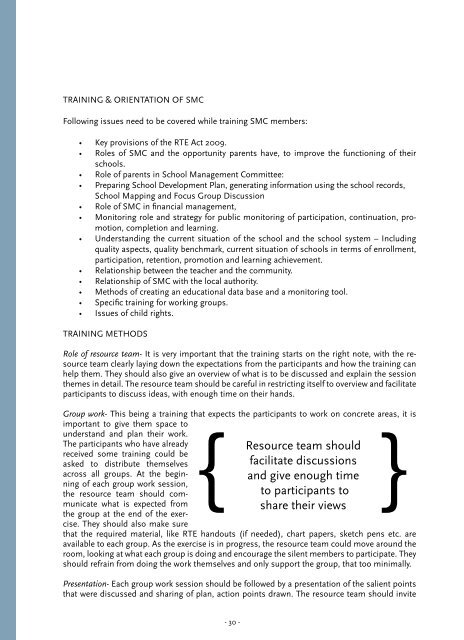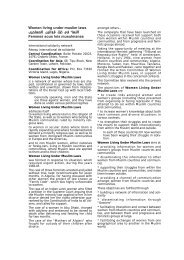SCHOOL MANAGEMENT COMMITTEE AND THE RIGHT TO EDUCATION ACT 2009
SMCBook1
SMCBook1
Create successful ePaper yourself
Turn your PDF publications into a flip-book with our unique Google optimized e-Paper software.
TRAINING & ORIENTATION OF SMC<br />
Following issues need to be covered while training SMC members:<br />
• Key provisions of the RTE Act <strong>2009</strong>.<br />
• Roles of SMC and the opportunity parents have, to improve the functioning of their<br />
schools.<br />
• Role of parents in School Management Committee:<br />
• Preparing School Development Plan, generating information using the school records,<br />
School Mapping and Focus Group Discussion<br />
• Role of SMC in financial management,<br />
• Monitoring role and strategy for public monitoring of participation, continuation, promotion,<br />
completion and learning.<br />
• Understanding the current situation of the school and the school system – Including<br />
quality aspects, quality benchmark, current situation of schools in terms of enrollment,<br />
participation, retention, promotion and learning achievement.<br />
• Relationship between the teacher and the community.<br />
• Relationship of SMC with the local authority.<br />
• Methods of creating an educational data base and a monitoring tool.<br />
• Specific training for working groups.<br />
• Issues of child rights.<br />
TRAINING METHODS<br />
Role of resource team- It is very important that the training starts on the right note, with the resource<br />
team clearly laying down the expectations from the participants and how the training can<br />
help them. They should also give an overview of what is to be discussed and explain the session<br />
themes in detail. The resource team should be careful in restricting itself to overview and facilitate<br />
participants to discuss ideas, with enough time on their hands.<br />
Group work- This being a training that expects the participants to work on concrete areas, it is<br />
important to give them space to<br />
understand and plan their work.<br />
The participants who have already<br />
received some training could be<br />
asked to distribute themselves<br />
across all groups. At the beginning<br />
of each group work session,<br />
the resource team should communicate<br />
what is expected from<br />
the group at the end of the exercise.<br />
They should also make sure<br />
}<br />
Resource team should<br />
facilitate discussions<br />
and give enough time<br />
to participants to<br />
share their views<br />
}<br />
that the required material, like RTE handouts (if needed), chart papers, sketch pens etc. are<br />
available to each group. As the exercise is in progress, the resource team could move around the<br />
room, looking at what each group is doing and encourage the silent members to participate. They<br />
should refrain from doing the work themselves and only support the group, that too minimally.<br />
Presentation- Each group work session should be followed by a presentation of the salient points<br />
that were discussed and sharing of plan, action points drawn. The resource team should invite<br />
each member of the group, to be a part of the presentation. The presenters should get adequate<br />
time to articulate their thoughts. This might need encouragement from the resource team.<br />
Discussions- Each presentation should be followed by a question-answer session. Here, the role of<br />
the resource team is important, as it has to moderate the discussion and ensure healthy participation<br />
from as many people as possible. The resource team could themselves, or even invite one<br />
of the participants to, summarize the discussion and share the important action points.<br />
Things to keep in mind:<br />
• There should be separate detailed training for members of the sub groups on specific themes.<br />
• The expectations from the participants need to be communicated clearly and reinforced during<br />
the training.<br />
• Participants should be given space to freely share their opinions and local knowledge pertinent<br />
to the issues being discussed.<br />
• The training should be documented by members of the resource team.<br />
• The schedule should not be packed and must allow some buffer time to allow discussions to<br />
lead to logical conclusions.<br />
A TRAINING ON SDP PREPARATION COULD LOOK LIKE THIS:<br />
SESSION <strong>THE</strong>ME SUB-<strong>ACT</strong>IVITIES EXPECTED OUTCOMES<br />
1 Welcome &<br />
Introduction<br />
2 Provisions of RTE<br />
Act <strong>2009</strong><br />
3 School<br />
Development<br />
Planning<br />
4 Preparation of demo<br />
plan<br />
5 Role of participants<br />
in spreading the RTE<br />
awareness, strengthen<br />
SMCs<br />
Introduction of participants (to<br />
cover their roles in SMC & SHG)<br />
Objective of the training<br />
Introduction to the Act<br />
Group work- read and dicsuss<br />
the handouts on RTE<br />
Presentation- each group presents<br />
its understanding of RTE<br />
Introduction to SDP<br />
Group work- each group looks at<br />
different aspects of SDP: Social<br />
mapping, Village survey, School<br />
infra. mapping, RTE norms<br />
Presentation- each group presents<br />
its work<br />
Overview on-Data collection,<br />
data analysis & sequencing<br />
Group work- SDP writing<br />
Presentation SDPs<br />
Overview of RTE awareness<br />
plan in villages (including monitoring<br />
mechanism/tools)<br />
Group work- each group will<br />
discuss the expansion plan for<br />
their respective areas<br />
Preparation of action plan<br />
Participants understand the<br />
objectives of the program and<br />
what is expected from them<br />
Participants discuss and share<br />
opinions on RTE. They also<br />
articulate the Act in their own<br />
words<br />
Participants understand the<br />
planning process for SDP- processes<br />
and steps involved, data<br />
collection, use of formats, etc<br />
Participants develop a demo<br />
SDP by analyzing the data provided<br />
to them<br />
Participants get to understand<br />
their role as a resource group.<br />
They also plan how to best use<br />
SHGs and SHG Federations<br />
as effective platforms for such<br />
work<br />
- 30 - - 31 -



